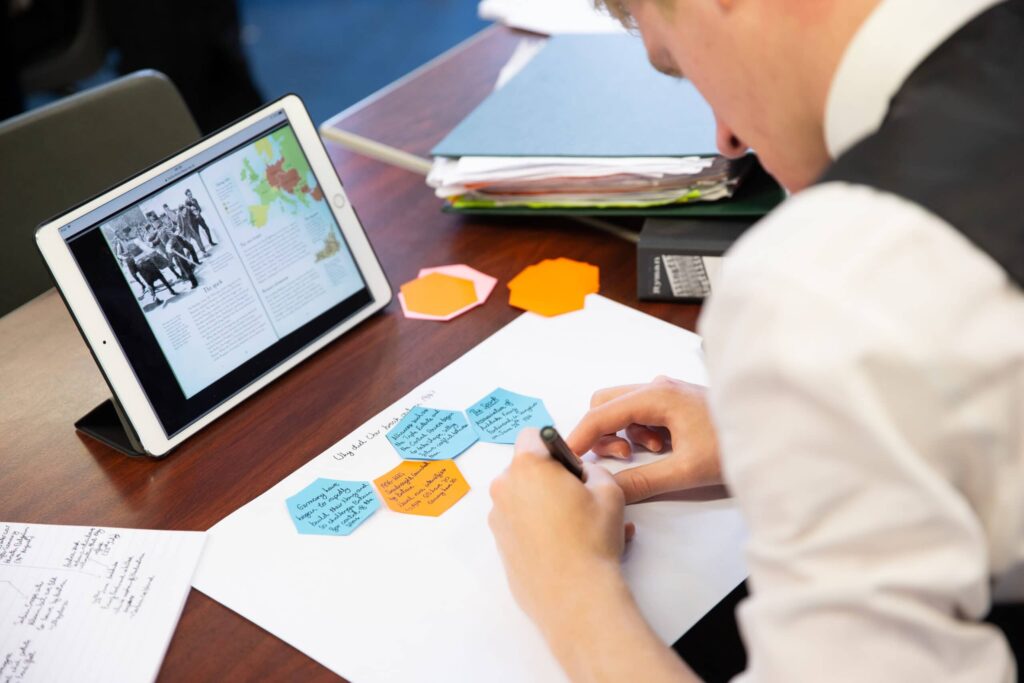The history of homework is an interesting one. Cooper and Valentine give a short but insightful overview.
Early in the twentieth century, educational theories suggested that homework could be an important means for disciplining children’s minds. By the 1940s, a reaction against homework set in. Developing problem-solving abilities, as opposed to learning through drill, became a central task of education. The trend toward less homework was reversed in the late 1950s after the Soviets launched the Sputnik satellite. U.S. educators became concerned that a lack of rigor in the educational system was leaving children unprepared to face a complex technological future and to compete against our ideological adversaries. Homework was viewed as a means for accelerating the pace of knowledge acquisition. By the mid-1960s, the cycle again reversed itself. Homework came to be seen as a symptom of too much pressure on students. Contemporary learning theories again questioned the value of homework, and the possible detrimental mental health consequences of too much homework were brought to the fore. Wildman (1968) wrote, “Whenever homework crowds out social experience, outdoor recreation, and creative activities, and whenever it usurps time devoted to sleep, it is not meeting the basic needs of children and adolescents” (p. 203). By the mid-1980s, views of homework again shifted toward a more positive assessment. In the wake of declining achievement-test scores and increased concern about [a country’s] ability to compete in a global marketplace, homework underwent its third renaissance in the past 50 years (2001: 145-146).
The research suggests both positive and negative correlations between homework and academic achievement. However, here I only focus on considerations which can have direct implications for the classroom.
The majority of the literature concentrates on homework as a positive factor in students’ attainment, focusing on students from lower socioeconomic backgrounds and those attending under-performing schools. Galloway, Conner & Pope (2013) studied 4,317 pupils from 10 high-performing schools. They found that pupils averaged around 3 hours of homework per day. They concluded that those who engaged more with homework experienced greater behavioural engagement in school but more academic stress, physical health problems, and a lack of balance in their lives, expressing lack of time to pursue individual academic interests. Homework was perceived as a stressor in pupils’ lives and a hindrance in their well-being, learning and full engagement.
So what can make a difference?
- Feedback: Timely feedback is crucial in the learning process. Without feedback which provides learning targets, the benefits of homework can be reduced. However, homework is there to assist the development of the student, without there always being the need to give a grade or extensive feedback.
- Quality rather than quantity: Measuring homework by the time spent is an inadequate and imprecise measure that does not take into account the quality of work or the ability of the student. There needs to be a shared language amongst teachers as to how to measure homework through qualitative measures. This can draw from the literature on formative assessment.
- Purpose: The success criteria and purpose of homework needs to be shared with the students. Drawing from metacognitive theories, we suggest: a. Criteria which at times can be co-constructed with students; b. 3 types of homework which are spread across subjects and teachers choose from for each homework: 1) practice/consolidation 2) individual or group research for independent learning 3) preparation for upcoming lesson.
- Study skills: the data collected suggested that a lot of students find distractions and procrastination as one of the main hindrances in their completing homework effectively and efficiently. A compulsory Study Skills module could be introduced in younger ages (Kohn 2006).
references and suggested reading:
Bempechat, J. 2004. The motivational benefits of homework: a social-cognitive perspective
Carr, N. S. 2013. Increasing the effectiveness of homework for learners in an inclusive classroom. School Community Journal, 23(1), 169-173.
Cooper, H., Robinson, J. C., & Patall, E. A. 2006. Does homework improve academic achievement? A synthesis of research, 1987–2003. Review of Educational Research, 76(1), 1–62.
Cooper, H. & Valntine, J. 2001. Using research to answer practical questions about homework, Educational Psychologist, 36(3), 143-153.
Corno, L. & Xu, J. 2004. Homework as the job of childhood. Theory into Practice, 43(3), 227-233.
Dettmers, S., Trautwein, U. & Lüdtke, O. 2009. The relationship between homework time and achievement is not universal: evidence from multilevel analyses in 40 countries. School Effectiveness and School Improvement, 20(4), 375-405.
Earp, J. 2014. Does homework contribute to student success? Available at https://www.teachermagazine.com.au/articles/does-homework-contribute-to-student-success [accessed 20.2.2018].
Epstein, J. L. & Van Voorhis, F. L. 2001. More than minutes: teachers’ roles in designing homework, Educational Psychologist, 36:3, 181-193.
Eren, O. & Henderson, D. J. 2011. Are we wasting our children’s time by giving them more homework? Discussion Paper No. 5547. Available at http://ftp.iza.org/dp5547.pdf [accessed 20.2.2018].
Falch, T. & Rønning, M. 2012. Homework assignment and student achievement in OECD countries, Discussion Papers No. 711, Statistics Norway, Research Department.
Galloway, M., Conner, J. & Pope, D. 2013. Non-academic effects of homework in privileged, high-performing high schools, The Journal of Experimental Education, 81(4), 490-510.
Garland, R. 1991. The mid-point on a rating scale: is it desirable? Marketing Bulletin Research Note, 2:66-70.
Göllner, R., Damian, R. I., Rose, N., Spengler, M., Trautwein, U., Nagengast, B., & Roberts, B. W. 2017. Is doing your homework associated with becoming more conscientious?, Journal of Research in Personality, 71: 1-12.
Keith, T.Z., & Cool, V.A.1992. Testing models of school learning: Effects of quality of
instruction, motivation, academic coursework, and homework on achievement. School
Psychology Quarterly, 3: 207–226.
Kohn, A. 2006. The homework myth: Why our kids get too much of a bad thing. Cambridge, MA: DaCapo Press.
Kralovec, E., & Buell, J. 2000. The end of homework: How homework disrupts families, over-burdens children, and limits learning. Boston, MA: Beacon.
Nadler, J. T., Weston, R., Voyles, E. C. 2015. Stuck in the middle: the use and interpretation of mid-points in items on questionnaires, The Journal of General Psychology, 142(2): 71-89.
Núñez, J. C., Suárez, N., Rosário, P., Vallejo, G., Cerezo, R. & Valle, A. 2015. Teachers’ feedback on homework, homework-related behaviours, and academic achievement, The Journal of Educational Research, 108(3): 204-216.
Parker, C. B. 2014. Stanford research shows pitfalls of homework, Stanford News. Available at https://news.stanford.edu/2014/03/10/too-much-homework-031014/ [accessed 20.2.2018].
Paschal, R. A., Weinstein, T. & Walberg, H. J. 1984. The effects of homework on learning: a quantitative synthesis, The Journal of educational research, 78(2): 97-104.
Rønning, M. 2011. Who benefits from homework assignments? Economics of Education Review, 30: 55-64.
Warton, P. M. 2001. The forgotten voices in homework: views of students, Educational Psychologist, 36(3): 155-165.




